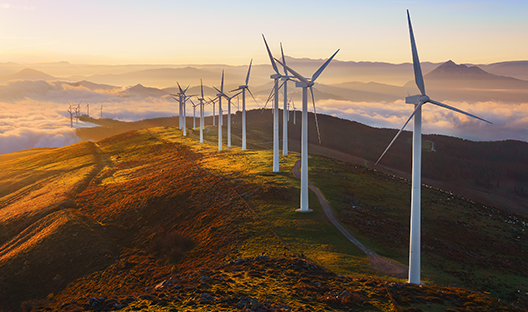Get Focus insights straight to your inbox
“Our planet has two lungs, one is green, the other is blue”
The 14th United Nations Sustainable Development Goal is ‘Life below water’, which seeks to "conserve and sustainably use the oceans, seas and marine resources for sustainable development".
When we think about environmental challenges and climate change, the focus is often placed on activities carried out on land and thus solutions are sought in terms of renewable energy, switching to plant-based diets and sources of protein as well as decreasing pollution and planting trees – the perceived ultimate carbon sequestrators.
However, we perhaps don’t pay enough attention to the role that the oceans play when considering challenges such as food security, employment and combatting climate change.
Documentaries such as Seaspiracy and My Octopus Teacher have recently elevated the discussions pertaining to life below water albeit from different perspectives. Seaspiracy, while perhaps controversial regarding the fallibility of the information presented, serves to evoke an emotional response that leaves viewers questioning the fishing industry, the importance of protecting our oceans and our role in it all.
A staggering statistic presented is that five million fish are killed every minute through commercial fishing and thus if this continues, we will have empty oceans by the year 2048 – only 27 years away.
Overfishing leads to unacceptable levels of ‘bycatch’, defined as the capture of other sea life while fishing for a specific species. The harmful side effects of overfishing for the world’s favourite seafood dishes are impossible to ignore.
A staggering statistic presented is that five million fish are killed every minute through commercial fishing and thus if this continues, we will have empty oceans by the year 2048 – only 27 years away.
The damage done through overfishing extends to life on land. Millions of people around the world rely on the ocean and its fish for protein as well as their livelihood. Small scale producers provide food to local communities and overfishing threatens the sustainability of their livelihood.
Financial think tank Planet Tracker has estimated that seafood production will have to increase by 118% by 2050 to meet the rise in demand for fish. With overfishing already a systematic issue, we must take urgent steps today to help ease the demand for fish and push large-scale producers to adopt sustainable fishing practices and fishing equipment.
Equally as alarming is the sheer scale of life on the ocean floor that is lost through bottom trawling, which far surpasses the millions of acres of land lost through deforestation.
However, what must be the most interesting statistic is that 93% of CO² is stored in our oceans, which makes it 20 times more effective than the Amazon in capturing CO² emissions. We are being taught daily about protecting forests to mitigate climate change, but we simply can’t ignore the importance of protecting our oceans and ensuring the sustainability of marine life.

The most interesting statistic is that 93% of CO² is stored in our oceans, which makes it 20 times more effective than the Amazon in capturing CO² emissions. We are being taught daily about protecting forests to mitigate climate change, but we simply can’t ignore the importance of protecting our oceans and ensuring the sustainability of marine life.
Climate action and the sustainability of life on earth requires us to maintain the integrity of our oceans and all life below water. My Octopus Teacher, which was filmed on the coastline of South Africa, rose to global acclaim and won best documentary feature at the 93rd annual Academy Awards earlier this year.
This documentary gives us an on-screen experience of a unique relationship built between a human and an octopus that is built over time based on reciprocity, trust and empathy. It not only transcends the limits of inter-species relationships and cohabitation, but gives us a deeper appreciation for our different worlds while showing us that while we are different, we are also much the same.
The ocean provides us with food, medicine, biofuel and an expansive body of beauty that supports complex ecosystems and the richest diversity of marine life.
Over three billion people depend on marine biodiversity for their livelihoods whilst around 40% of our oceans are affected by human activities which cause pollution, depleted fisheries and the loss of coastal habitats.
We simply cannot continue with exploitative and irresponsible behaviours that are destroying our oceans. In addition, the ocean provides many stressed corporate citizens with the chance to relax and unwind, offering us not only a place of economic sustenance but also a place of mental relaxation and rest.
As the ocean is the world’s largest carbon reservoir, the rising levels of CO² globally has contributed to the oceans becoming more acidic. This has had devastating effects on coral reefs and the loss of marine life found within those reefs, which has a direct human impact as we rely on these reefs for food, medicine and tourism income.
We need to reduce marine pollution, effectively regulate harvesting and end overfishing, conserve coastal and marine areas and seek to increase the economic benefits to small island developing states.
The targets underlying SDG 14 speak broadly to three areas of focus: ensuring the correct legislative policies are in place to protect our oceans, decreasing the adverse consequences of our activities on our oceans and placing more importance on preserving marine and coastal areas and ecosystems.
We need to reduce marine pollution, effectively regulate harvesting and end overfishing, conserve coastal and marine areas and seek to increase the economic benefits to small island developing states.
The global movement towards plastic-free alternatives has shone a light on just how much plastic we use. It is estimated that we already consume unhealthy levels of microplastic daily given the levels of plastic we have dumped into the oceans in the past. We need to continue the momentum created with plastic-free alternatives and make active choices to limit our plastic usage as far as possible.
If you live in a coastal area, volunteer for beach clean-ups and be sure to reuse, reduce and recycle wherever possible. If you visit a beach, be sure to remove any litter that may make its way into the ocean and spread awareness about the impact of marine litter.
If you do not live near a coastal area, take the time to investigate the source of the seafood you consume, the working conditions of the fishing industry and other factors that might be of importance in empowering you with the knowledge to make informed decisions. Learn to explore the watershed closest to you that connects to the ocean.
If we make small changes to the way we live, we can achieve SDG 14, prioritising life below water in the same way we prioritise our life on land. To quote David Attenborough “the living world can’t operate without a healthy ocean and neither can we”.

Responsible Investing and Sustainability at Investec Wealth & Investment
As Sustainability is core to our fundamental investment approach, we have integrated ESG considerations into our investment decision making and broader investment process.




